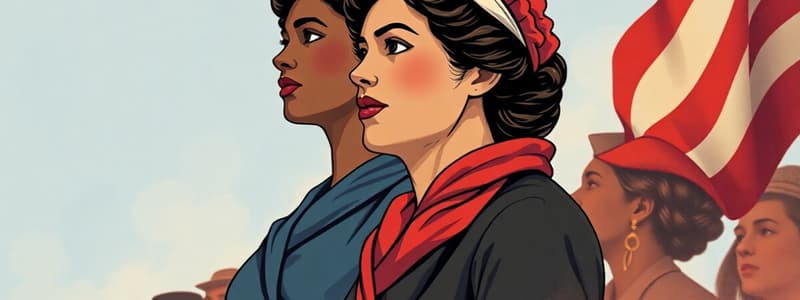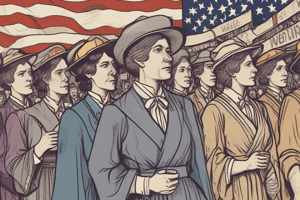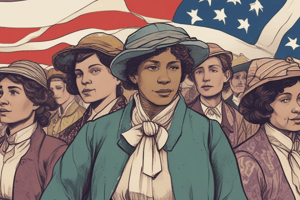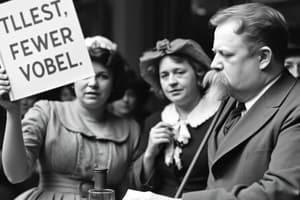Podcast
Questions and Answers
The Seneca Falls Convention in 1848 primarily focused on advocating for women's suffrage as its sole objective.
The Seneca Falls Convention in 1848 primarily focused on advocating for women's suffrage as its sole objective.
False (B)
Elizabeth Cady Stanton fully embraced the idea of immediately voting once women were given the right to do so.
Elizabeth Cady Stanton fully embraced the idea of immediately voting once women were given the right to do so.
False (B)
All women in the United States were united in their support for universal suffrage during the late 19th and early 20th centuries.
All women in the United States were united in their support for universal suffrage during the late 19th and early 20th centuries.
False (B)
Brewers and distillers opposed women's suffrage because they feared it might endanger restrictions on child labor.
Brewers and distillers opposed women's suffrage because they feared it might endanger restrictions on child labor.
The National American Woman Suffrage Association exclusively employed violent methods of protest to achieve its goals.
The National American Woman Suffrage Association exclusively employed violent methods of protest to achieve its goals.
The United States was among the first nations in the world to grant women the right to vote nationally.
The United States was among the first nations in the world to grant women the right to vote nationally.
President Woodrow Wilson's support for women's suffrage was a direct consequence of women's contributions to the war effort during World War I.
President Woodrow Wilson's support for women's suffrage was a direct consequence of women's contributions to the war effort during World War I.
The Nineteenth Amendment to the American Constitution was ratified in 1919, granting women the right to vote.
The Nineteenth Amendment to the American Constitution was ratified in 1919, granting women the right to vote.
Arguments for women's suffrage were solely based on principles of gender equality and had no economic motivations.
Arguments for women's suffrage were solely based on principles of gender equality and had no economic motivations.
Guidelines promoting gender-inclusive language are solely an American initiative and are not observed by international organizations.
Guidelines promoting gender-inclusive language are solely an American initiative and are not observed by international organizations.
Flashcards
Women's Suffrage
Women's Suffrage
The principle of giving women the right to vote, a key issue in women's rights movements.
Seneca Falls Convention
Seneca Falls Convention
A meeting in 1848 where a list of demands for women's rights, including suffrage, was created.
Declaration of Sentiments
Declaration of Sentiments
A document from the Seneca Falls Convention listing grievances against the American government regarding women's rights.
Anti-Suffrage Women Groups
Anti-Suffrage Women Groups
Signup and view all the flashcards
Nineteenth Amendment
Nineteenth Amendment
Signup and view all the flashcards
National American Woman Suffrage Association
National American Woman Suffrage Association
Signup and view all the flashcards
Gender-Inclusive Language
Gender-Inclusive Language
Signup and view all the flashcards
Study Notes
- 2020 marks the 100th anniversary of women's right to vote in the United States.
- Initially, only men with property could vote in most American states.
- Women were excluded from voting due to prejudices.
- Many women fought against these prejudices by founding activist groups and organizing conventions.
- A convention held at Seneca Falls in 1848 resulted in a ‘Declaration of Sentiments’ which contained a list of grievances aimed at the American government, with the lack of women’s suffrage as the first grievance.
- The struggle of women was not just about the right to vote, but extended to other rights like equal pay for equal work, as emphasized by activist Elizabeth Cady Stanton.
Opposition to Women's Suffrage
- Not all women favored universal suffrage.
- Anti-suffrage groups believed politics was a dirty business and women should not partake in it.
- They also worried that women acting like men would destroy the family and promote socialism.
- These women were usually white and upper class, fearing that giving rights to the poor would lead to the loss of their privileges.
- Brewers and distillers opposed women's suffrage, fearing women would make alcoholic drinks illegal due to the women's movements' fight against alcoholism.
- Some industrialists opposed women's suffrage, believing women would support the abolition of child labor.
The Nineteenth Amendment
- In 1890, the National American Woman Suffrage Association was founded to protest the exclusion of women from the political organization of society.
- The US entry into World War I in 1917 changed things as women substituted men in factories and offices.
- In 1918 President Woodrow Wilson acknowledged women's contributions to the war effort.
- In 1920, the Nineteenth Amendment to the American Constitution granted universal suffrage.
- New Zealand (1893) and Australia (1902) had already granted women the right to vote.
Gender-Inclusive Language and Social Activism
- Aspects of American society favored men politically, economically, and culturally, also true for many other societies.
- Languages can also have a male bias.
- The European Parliament issued guidelines to change discriminatory terms that are only used in the masculine.
- Examples include using 'chairperson' instead of 'chairman,' 'humanity' instead of 'mankind,' and 'police officer' instead of 'policeman.'
- The United Nations also has guidelines favoring gender-inclusive language and discouraging discriminatory expressions towards both women and men.
- The fight of women for the right to vote proved that progressive political reforms are often determined by popular pressure.
Studying That Suits You
Use AI to generate personalized quizzes and flashcards to suit your learning preferences.




